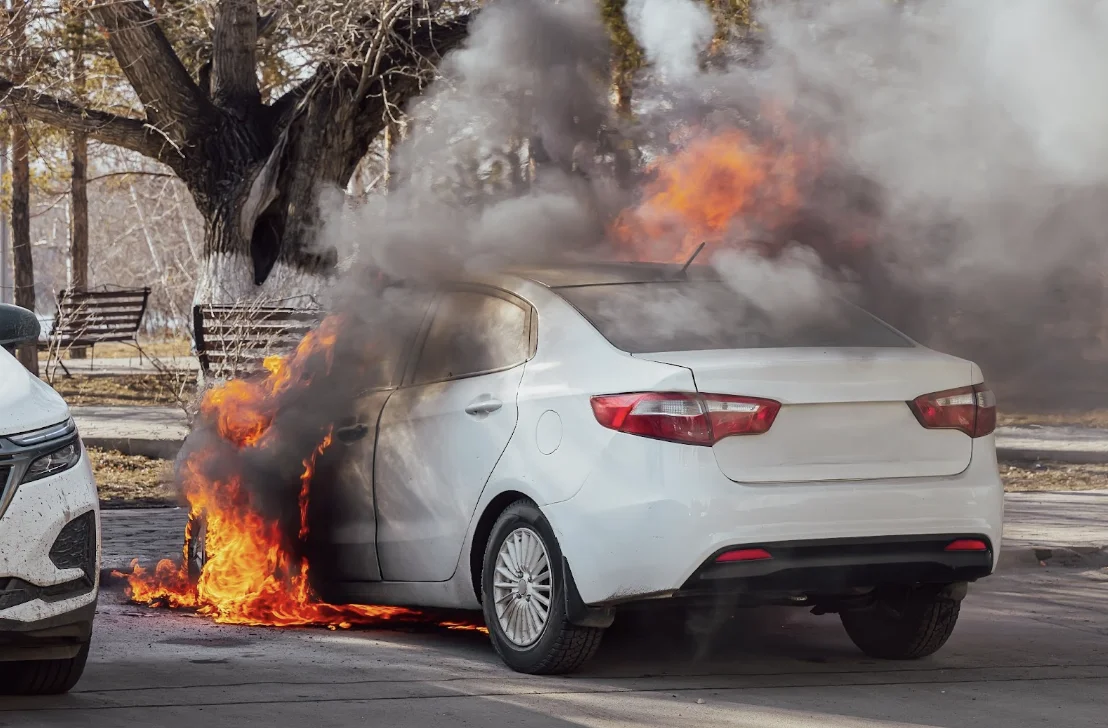Car fires are rare but can be very dangerous. Every year, thousands of car fires occur, often due to problems that could be prevented. This guide will help you understand why car fires happen, how to prevent them, and what steps to take if you experience one.
Causes of Car Fires
Several factors can lead to a car catching fire, including issues with the car’s electrical system and leaks from the fuel system. Here are some common causes:
-
Electrical Problems
Faulty wiring or problems with the car’s electrical components can cause sparks that may ignite a fire.
-
Fuel Leaks
If fuel leaks from the tank or line, it can quickly catch fire.
-
Oil and Other Fluid Leaks
Oil or other flammable liquids that leak and reach hot car parts, like the exhaust, can start a fire.
-
Overheating Parts
Car parts like the engine or the exhaust system can get too hot and cause a fire.
-
Poor Maintenance
Not taking good care of your car can lead to serious issues like fires. Sometimes, fires are also caused by the car’s design problems or even on purpose by someone (arson).
Preventive Measures
To avoid car fires, it’s important to keep your car well-maintained. This means:
- I regularly checked the car’s electrical and fuel systems during service visits.
- I watched for signs of potential fire hazards like unusual noises from the exhaust or rapid oil or fuel level changes.
- You are ensuring that any recalls on your car are fixed, as these can sometimes be related to fire risks.
Steps to Take During a Vehicle Fire
If you notice smoke or flames coming from your car while driving, interacting quickly, and staying calm is crucial. Here’s what you should do:
-
Signal and Move to Safety
As soon as it’s safe, signal and pull over to a safe spot away from traffic.
-
Stop and Turn Off the Engine
Turning off the engine cuts the fuel supply and can help prevent the fire from worsening.
-
Get Everyone Out Safely
Once the car is stopped, everyone should get out quickly and never return to the car to get personal items.
-
Stay Clear of the Car
Move at least 100 feet from the burning car to avoid flames and toxic fumes. Keep others back as well.
-
Call for Help
Call 911 immediately.
-
Warn Others
If possible, alert oncoming traffic to avoid the danger area.
Post-Fire Actions
After a car fire, it’s important to handle the situation safely:
-
Don’t Reopen the Car
If there’s a fire risk in another part of the car, like the trunk, don’t open it. Air can make the fire worse.
-
Contact Your Insurance
Take pictures of the damage and note details and witnesses. This will help with your insurance claim. Talk to your insurance company about what to do next, especially if the car is a total loss.
Car Fire Extinguishers
It’s a good idea to have a fire extinguisher in your car. Here are a few tips:
-
Temperature Storage
Keep the extinguisher in conditions between -40 and 120 degrees Fahrenheit.
-
Secure It
Make sure it’s mounted securely so it doesn’t move around.
-
Maintenance
Check it regularly to ensure it’s in good working condition.
-
Learn to Use It
Know how to use the extinguisher to act quickly.
Summary
Understanding the causes and prevention of car fires and knowing what to do if one happens can save lives. Regular maintenance and being prepared with the right tools, like a fire extinguisher, are key. Stay calm, act quickly, and prioritize safety to handle a car fire emergency effectively.
FAQs
What type of fire extinguisher is best for a car?
The best type of fire extinguisher for a car is a dry chemical extinguisher that is rated Class B and Class C. These are effective against flammable liquids and electrical fires, which are the most common types of car fires.
Can a car fire explode?
While car fires can be extremely dangerous, explosions are not as common as you might think. However, certain parts of the car, like the fuel tank, can potentially explode under specific conditions. It’s crucial to move away from the vehicle to a safe distance.
Are older vehicles more prone to fires?
Older vehicles may be more susceptible to fires due to wear and tear, outdated electrical and fuel systems, and potentially less rigorous maintenance. Regular checks and upkeep are crucial, especially for vehicles over ten years old.
How can I prevent my car from catching fire in hot weather?
In hot weather, ensure your vehicle’s fluids are topped up, and the cooling system is functioning correctly. Park in the shade when possible, and avoid overloading electrical outlets within the car, such as using a portable cooler for prolonged periods.
Get the right coverage for your car with tutenagency
New tutenagency customers?
Quote auto insurance online or call (334) 502-5111 to insure your vehicle.
Legal Disclaimer: ADVERTISING MATERIAL ONLY. Do not rely on this site or this article for legal or financial advice. The information provided on 210agency.com is strictly for educational purposes and to provide you with general educational information. Since state laws and financial regulations are subject to change, please schedule an appointment with an attorney or qualified financial advisor in your area to further discuss your personal situation. This public information is neither intended to, nor will it, create an attorney-client or financial representative relationship

